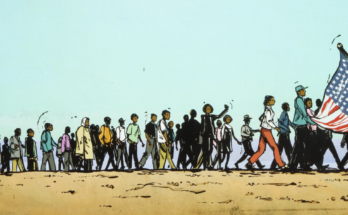A Southern child who blossomed during the civil rights era, Hoy Kersh always had rebellious tendencies. That’s why her parents encouraged her to move North when she was just a teenager in the 1950s. “I was too vocal,” she explains. “They had begun to burn houses.”
The 70-year-old grandmother recently wrote an autobiography, A Suitcase Full of Dreams, about the Jim Crow South of the 1940s and 50s. She planned to immediately write a sequel called The Bus Ride about her political awakening, the beauty of nonviolent protests and the end of segregation.
Then Occupy Wall Street began. The spontaneous uprisings that followed reminded her of the protests of her youth. “The politics of today really jumped into my book,” Kersh says. She began interviewing Vietnam vets and inner-city gangmembers. She grabbed a film camera and started documenting Occupy protests happening around the country. She talked with a lot of people who don’t feel like they have options or a future. And that reminded her a lot of the people she knew, growing up.
“That’s why I say slavery’s not dead yet,” Kersh says. “We’ve gained a lot materially and lost a lot spiritually. Back then, there was a chance that if you went to college, you’d get a job. That’s not the case now.” And, she points out, modern slavery is not dictated by skin color, it’s about who has the money.
A Suitcase Full of Dreams begins with a lynch mob scene, one that drove Kersh and her family out of their home. By the time the slender novel ends, she’s been kicked out of school, has survived a rough home life and is 16, headed to a big city in the North to become, she hopes, a great writer like Langston Hughes.
Of course, her life didn’t end there. She discovered that segregation existed even in Chicago (this was, after all, the 1950s). She married (badly, she says), had three kids, two jobs and led a kind of dead-end life. Then she had a random encounter with a couple of white hippies, who introduced her to pot and Bob Dylan. Listening to him sing, “I’m not going to work on Maggie’s farm no more,” she had an awakening.
“I saw there was another way to live,” she explains. She moved to California with a friend and never looked back. She owned an organic farm in Jamaica for a little while. She started a reggae band with her kids, putting her poems to music and performing around the country. They traveled like gypsies for several years.
Then her children grew up. They married, had their own children and didn’t want to tour anymore. “I was stuck with 100 songs and no band,” she says with a laugh. So she started writing about her life. She kept it short and honest and wrote about what it was like growing up black in the South at that time.
“I remember at the movie theater, we had to go up the stairs to sit in the back of the balcony and the white kids sat downstairs,” Kersh says. “When we’d pass each other, we would look at each other and think, ‘Awww… I wish I could know you.’ There wasn’t any hatred, we were just kids.”
She didn’t realize how deep the scars went from living that way until she started hearing from her readers.
“I got a letter from a woman who was about the same age I was,” Kersh says. “She went to school in Mobile. And she told me that when she was a child, she thought there was a black heaven and a white heaven.”
She also heard from an 81-year-old white woman who was touched by her writing. “She sent me a letter … it was beautiful,” Kersh says.
The book hasn’t found major distribution. It hasn’t been reviewed by Oprah. But Kersh doesn’t care.
“As long as I can reach hearts, that’s what I want to do,” she says.
To learn more about the author or to purchase Suitcase Full of Dreams, visit hoykersh.com. The novel also is available from amazon.com.



